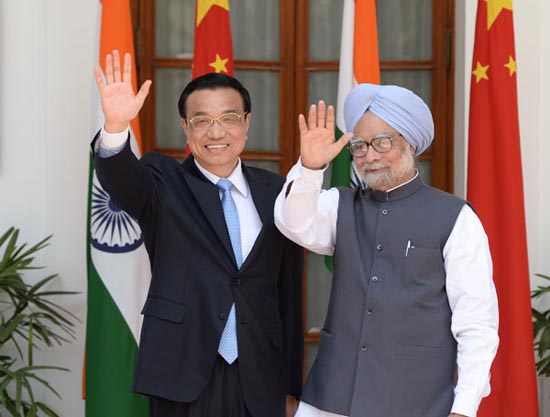
 |
| Premier Li Keqiang meets his Indian counterpart Manmohan Singh in New Delhi on Monday during his first foreign trip since taking office. Xinhua |
Two nations sign agreements covering trade, culture and water resources
Border disputes and trade friction cannot prevent China and India from building strategic mutual trust and cooperation, Premier Li Keqiang said during his visit to India on Monday.
The two nations enjoy "far more common interests" than differences, he said after meeting Indian Prime Minister Manmohan Singh, adding that the countries will not harm one another, because neither will benefit from doing so.
Both nations have enough will, wisdom and capability to jointly create "new bright spots" in cooperation among Asian countries to provide a driving force for the world economy, Li said.
On the second day of his official visit to India — the first stop on Li's nine-day first foreign tour since taking office in March, China and India signed a joint statement and a series of agreements covering trade, culture and water resources.
The two nations proposed building an economic corridor across Myanmar and Bangladesh to connect two major economies in Asia. They also said they want to seek further cooperation in the development of industrial zones and public infrastructure projects.
Singh said, "We agreed that the relationship between our two economies is of growing significance and is essential for our peaceful development and sustained economic growth, as well as for stability and prosperity in our region and the world."
He said economic cooperation constitutes a very important part of the Sino-Indian relationship.
"I conveyed to Li our concerns about the trade deficit, and sought increased market access to China for our exports and investment. I also invited increased Chinese investment ... in our infrastructure and manufacturing sectors."
China is India's second- largest trading partner, while India is China's largest trading partner in South Asia. In 2012, the bilateral trade volume was about $70 billion, and the two countries have set a bilateral trade target of $100 billion by 2015.
 |
















 Death toll from E. China plant blast hits 12
Death toll from E. China plant blast hits 12


![]()
